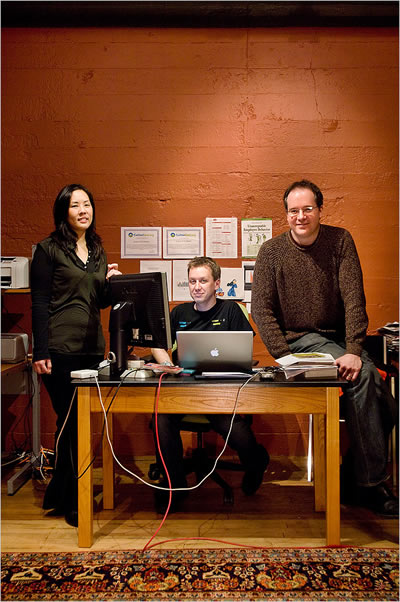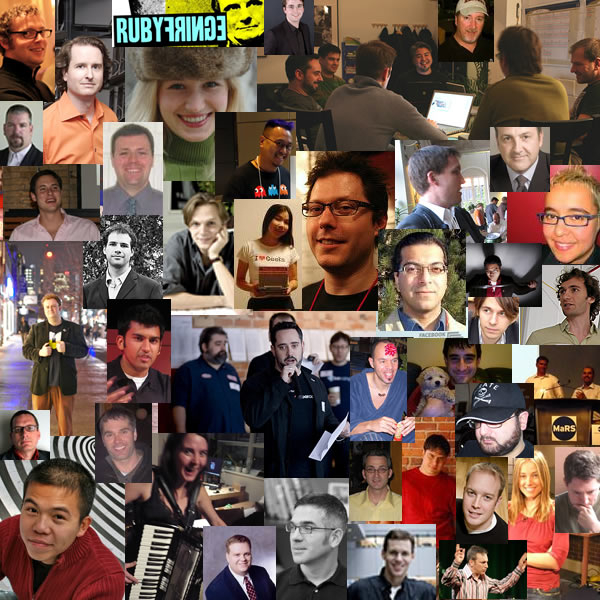Seattle Taps Its Inner Silicon Valley

Jenny Lam, Hillel Cooperman and Walter Smith of the software company Jackson Fish Market.
Seattle Taps Its Inner Silicon Valley is a recent New York Times article that opens with a pretty dramatic statement that I hope we’ll someday say about this weblog’s home city, Toronto: “Many communities dream of becoming the next Silicon Valley. [Seattle] is actually doing it.”
The city has its share of big players: Microsoft has its headquarters the nearby suburb of Redmond as well as satellite offices in Seattle proper, Amazon is based there, Google has a research lab there and Nintendo’s American headquarters is also in the area. However, the real topic of interest — from both the article’s point of view as well as mine — is the city’s startup ecosystem. “More young companies are moving in downtown,” says the article, “near the art galleries and bookstores around Pioneer Square. Still others are spreading into the surrounding suburbs.” A number of these startups fall into interestingly-named categories:
- The “Baby Bills”, startups formed by ex-Microsofties. The name comes (obviously) from Microsoft co-founder Bill gates and (less obviously for those of you who might be too young to remember) the “Baby Bells” that emerged from the breakup of AT&T.
- The “Baby Jeffs”, startups created by former Amazon employees, named after Amazon’s Jeff Bezos.
- The “Baby Sergeys”, startups run by former Googlers, named after Google’s Sergey Brin.
Silicon Valley got its start as the “Fairchildren” left Fairchild to form their own companies, whose employees moved between them or formed their own spin-off companies, creating the atmosphere of cross-pollination that turned the area into a high-tech Mecca. The same thing seems to be happening in Seattle, according to Walter Smith of Seattle software company Jackson Fish Market: “Seattle is like an adolescent version of Silicon Valley,” he says.
Just as Silicon Valley has Stanford, Seattle has University of Washington, which the article says is fostering the area’s entrepreneurial spirit in the same way. Another similarity is the area’s old industry: aerospace, which provided an earlier boom in the Seattle area, just as it did in the Valley. Now the entrepreneurs and venture capital are moving in, and there are social networks, support businesses and a business culture that views failure as a badge of honour, not shame.
How Green Was My Valley

Scenes from the Valley’s El Camino Real (left) and Seattle’s Pioneer Square (right).
The New York Times article on Seattle inspired this response on Seattle-based Redfin’s corporate blog: How Green Was My Valley. Where the Times chose to focus on the similarities between the Valley and Seattle, How Green Was My Valley takes the opposite tack and focuses on the differences. some of which are:
- Seattle has become unrecognizably wealthier in the past decade, yet is oddly unhappy about it. While Seattle has people who get nostalgic for the city’s good old days, the amnesiac Valley — most of whose denizens only came there for the tech gold rush — have neither the history there, nor any real connection to the place.
- People live in Seattle because they love Seattle — the lifestyle and schools, the mountains and the lakes. Contrast this with the blog article’s author’s story about his first roomate: “My first roommate spent four years building a company in San Francisco without ever buying furniture. When his startup went bust, he packed for the trip home to Toronto the same day.”
- The high cost of living keeps the Valley in a sort of post-adolescent collegiate state. A two-bedroom house in “Shallow Alto” (that was our nickname for it during the OpenCola days) will set you back $1.5 million, which prevents people from buying a suitable place for starting a family. “In Silicon Valley,” goes the author, “Seattle’s 28 year-old family man is still working his tail off for a hit.”
- Stanford is the Valley’s “Hogwarts”. “…without Stanford the Valley would grow old and die,” says the author. “Native Seattleites hardly notice Seattle’s Stanfordlessness; Valley expats never get over it.”
- Here’s something that reminded me of Paulina Borsook’s book Cyberselfish: In Seattle, “High-tech entrepreneurs are expected to be pillars of the business community…not, as Silicon Valley’s establishment likes to think of itself, pirates of the Caribbean.” Techies get involved in non-tech community organizations like the Rotary Club and seem to have a mindset connected to “a set of civic virtues bigger than any one company”.
- Seattle has a sense of “helping out” that’s much harder to find in the Valley: “And it has nurtured a rookie CEO like me. A Seattle journalist e-mailed me while I was still loading the tiny U-Haul that brought me here. A VC who should have eaten my gizzard for breakfast invited me to his lake house for dinner. A startup CEO who offered money-raising advice over lunch diverted us from Quiznos to Carmines.”
- The new-for-new’s sake ethos of the Valley isn’t so pervasive in Seattle. While techies in the Valley chase fashionable ideas, techies in Seattle have the freedom to work on less cool projects that work. Redfin itself is in the “uncool” business of real estate.
- There’s a sense of dedication and loyalty in Seattle. While many of Google’s engineer’s are “plotting their next startup on the company dime,” “ten years on at Microsoft, engineers deep in Redmond’s rain forests are still writing the next version of Office.”
- And finally, one similarity: both the Valley and Seattle have the weather as their selling point, for completely opposite reasons. Says Zillow’s Rich Barton of Seattle: “You work hard here because it’s gray. Then you go hiking or fishing or skiing.”
Toronto’s Challenge

A whole mess of Toronto tech people. Can you identify them all?
Along with Leila Boujnane, David Crow, Jay Goldman and Greg Wilson, I help put together the DemoCamp gatherings here in Toronto. As part of this group, as well as a Toronto-based techie and a long-time resident of this city (since 1975!), I have an interest in making Toronto a great place to work, live and play, in both my geek and non-geek modes.
As I’ve written before, I think that Toronto is an underappreciated gem of a city and that a lot of the elements required to make Toronto a high-tech startup hub are in place. We’ve got:
- A vibrant city,
- with a strong creative class,
- a healthy number of techies with a strong entrepreneurial bent,
- interesting neighbourhoods with lots of character,
- youth and liberalism,
- a local culture with strong social networks,
- a number of good universities in the area,
- and the Accordion Guy!
Okay, maybe the last item in that list isn’t absolutely necessary, but it couldn’t hurt.
There are a number of hurdles that we need to clear, not the least of which are the timidity of local investors and the sense among a lot of people here that “making it” means getting a job in a big company, not starting your own. Perhaps it’s a symptom of the national character; after all, Canada was founded by people loyal to the British Empire, people who said “Hey! We like being a colony! Taxation without representation? Fine by us! So King George talks to trees…who doesn’t?!”
I’m glad that there are a lot of people in Toronto who are thinking about this sort of thing, and I look forward to talking with them, making plans and putting them into action. Over the next little while, I’m going to talk about what it would take to build up Toronto as a high-tech hub and a livable city. Watch this space!
Earlier Articles on Toronto as a Startup Hub
In case you missed them, here are some links to older articles of mine about what it would take to turn Toronto into a startup hub:
- How to be Silicon Valley: My take on Paul Graham’s article, How to be Silicon Valley.
- On “How to be Silicon Valley”, Part 1: Comments on How to be Silicon Valley
- On “How to be Silicon Valley”, Part 2: Even more comments on How to be Silicon Valley.
- On “How to be Silicon Valley”, Part 3: In which Toronto high tech finds common ground with Toronto fashion.
- Silicon Valley Fight Club (or “How to be Silicon Valley, Part 4”): A private fight club made up of developers and engineers in Silicon Valley, and what it says about life there.
- On Becoming Silicon Valley, Part 5: Toronto developer David Janes’ take on How to Become Silicon Valley.
- On Becoming Silicon Valley, Part 6: My comments on Guy Kawasaki’s article, How to Kick Silicon Valley’s Butt.
5 replies on “Ideas to Steal from Silicon Valley and Seattle”
[…] [This article was also posted to Global Nerdy.] This entry was written by Joey deVilla and posted on February 16, 2008 at 12:00 am and filed under Uncategorized. Bookmark the permalink. Follow any comments here with the RSS feed for this post. Post a comment or leave a trackback: Trackback URL. « Three Hours of MTV from 25 Years Ago […]
[…] A couple of articles have already appeared in response to Ideas to Steal from Silicon Valley and Seattle: […]
[…] Global Nerdy | Ideas to Steal from Silicon Valley and Seattle – for making a better Toronto.. […]
Being from Toronto and having worked in both Toronto, Ottawa, and the US, I think Toronto has severe challenges.
1. We build workers…not leaders. We have loads of talent…but all we create is good worker bees.
2. Yes, lack of big companies is a big deal. There are some ‘entrepreneurs’ who will just go at it on their own. yet, the vast majority of people like a decent job. So they meet up at large companies…work for a while…then maybe decide to start their own thing. All we have in Toronto proper is IBM and AMD. Anyone care to explain how RIM was founded in Waterloo. I ask that as a serious question. How does a small town create the only great Canadian tech company in operation right now? Why was it not founded in Toronto? Ask that question a few times…over and over.
3. politicians do not understand business.
When you have someone like Miller who says he doesn’t care about companies who move to Mississauga for lower tax rates as he only wants companies who are willing to pay more to take advantage of Toronto’s urban character… you know something is wrong. They will try to push venture capital and ‘incubators…’.
As I say…mentality before process.
4. Sometimes you run out of talent
How many high tech centers do we need? Everywhere you go, there is a lack of talent. If Toronto tech can just pickup and move to Seattle, Silicon valley, New york, boston, dallas, austin… in an already established tech base, why woudl they bother doing it here? Better weather, lower taxes, more like-minded entrepreneurs.
It’s not impossible. But Toronto has it’s work cut out for it. The biggest threat to Toronto…is actually Waterloo. Very close to Toronto and with a large tech base. It’s largely a mentality gap. Toronto embraces bureaucracy and structure. Startups are about freedom and independence. If you will…that’s why RIM was founded in Waterloo as opposed to Toronto. No Toronto bureaucracy would have ever approved of RIM. I mean they would be competing against Motorola, Nokia, MS… impossible…that’s a bad investment.
[…] some food for thought. Ahmed Hassan very recently wrote a comment in response to an article of mine, Ideas to Steal from Silicon Valley and Seattle, and it’s […]